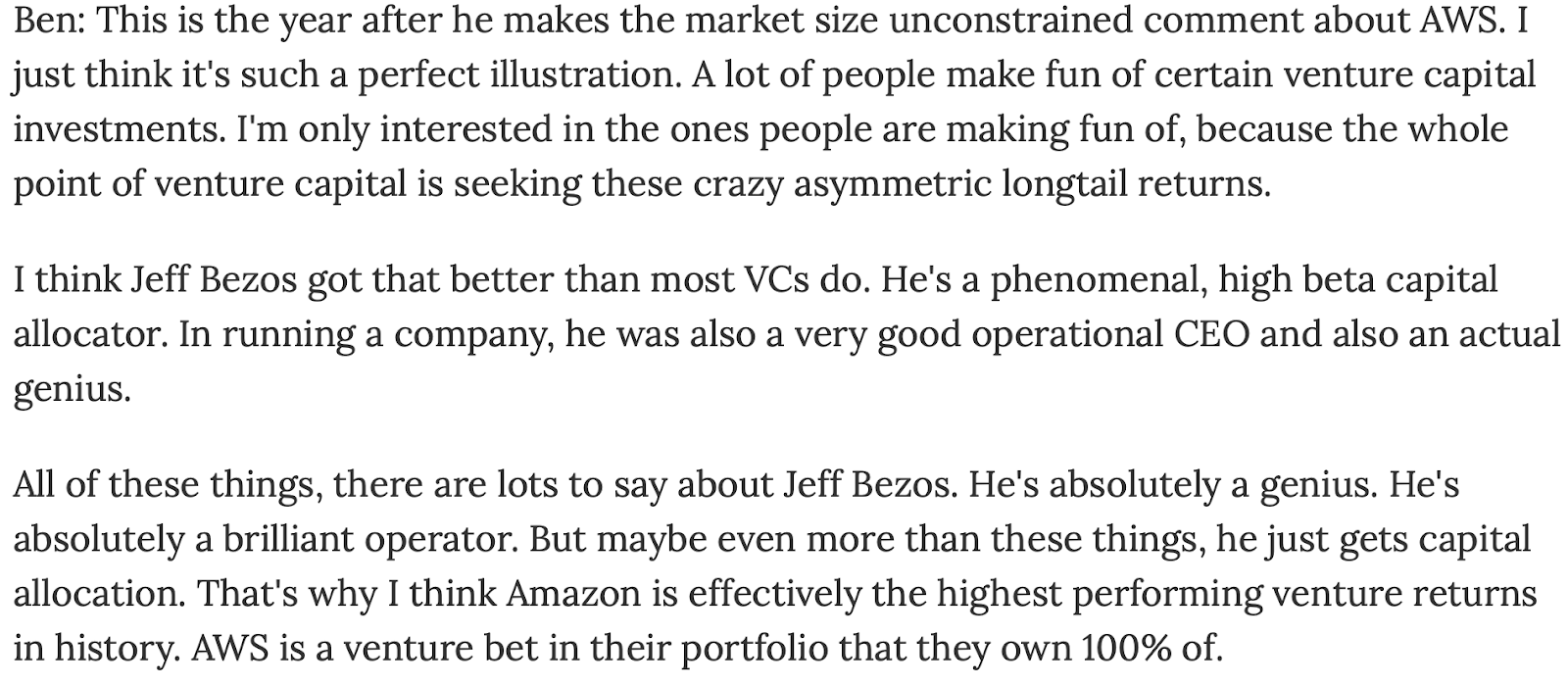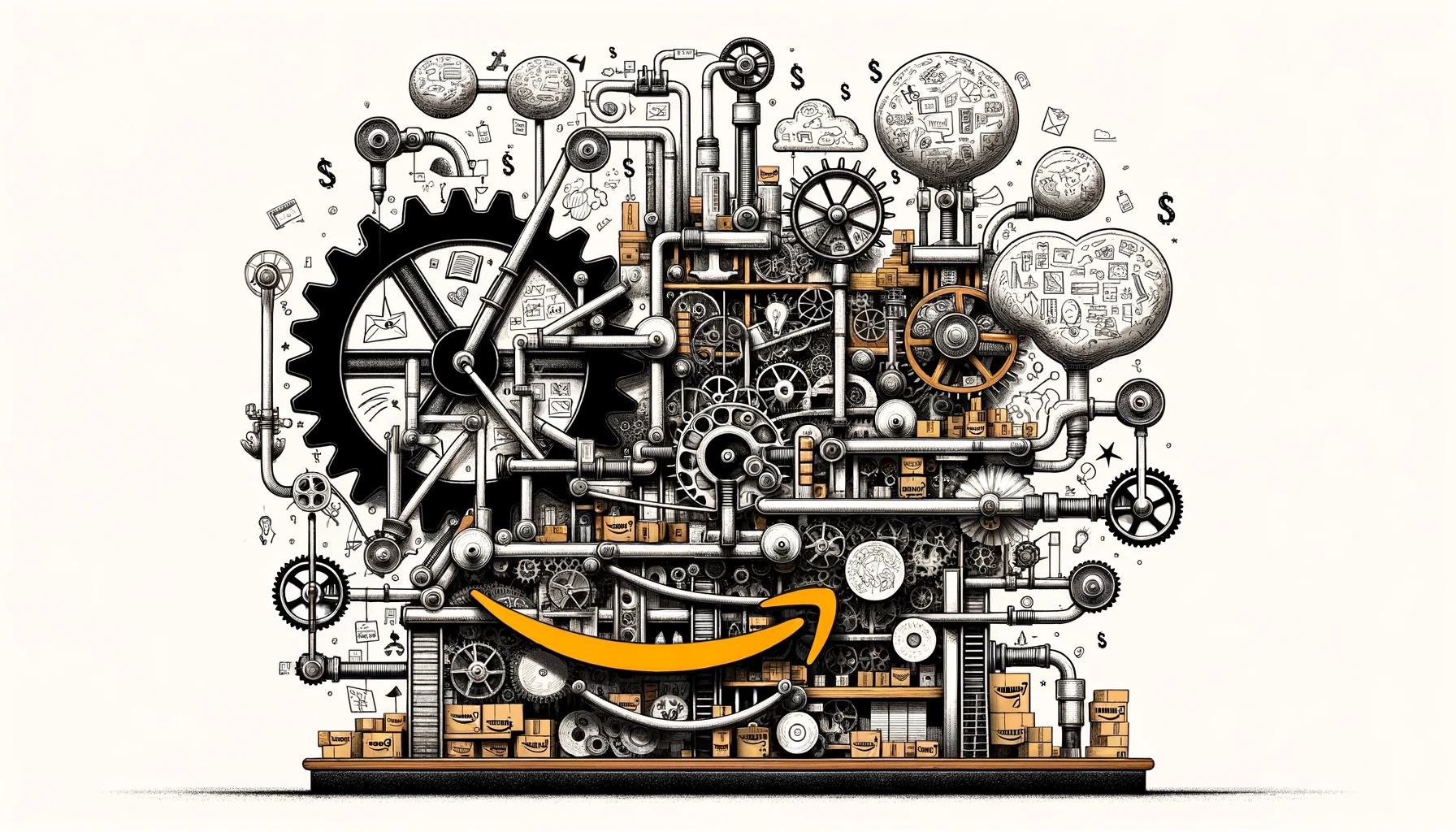Recently the case was made that Amazon has one of the best venture portfolios of all time. It takes VC level swings on projects it self funds. And when they pay off - they pay off big time. Ben Gilbert encapsulated this idea by saying, “AWS is a venture bet in their portfolio that they own 100% of.” In another world, AWS would have been a start-up. Born in someone’s garage and funded by some of the biggest VCs in the world. Instead, it was a bet made inside of Amazon and has grown to surpass the core Amazon business.

AWS isn’t the only example of this. Amazon is constantly spinning up new bets. There are winners (Kindle) and to be fair there are some flops as well (anyone reading this on a Fire Phone?) This culture of taking big swings and (mostly) producing winners starts at the top. Jeff Bezos has had a focus on big bets since Day 1. He started Amazon on the bet that one-day internet usage would be ubiquitous. And that customers would prefer to buy physical goods through a digital medium. Both bets seemed crazy at the time but paid off in a big way.
AWS isn’t the only example of this. Amazon is constantly spinning up new bets. There are winners (Kindle) and to be fair there are some flops as well (anyone reading this on a Fire Phone?) This culture of taking big swings and (mostly) producing winners starts at the top. Jeff Bezos has had a focus on big bets since Day 1. He started Amazon on the bet that one-day internet usage would be ubiquitous. And that customers would prefer to buy physical goods through a digital medium. Both bets seemed crazy at the time but paid off in a big way.
From that time forward, Amazon carried the mantra of “put big bets on the table.” Bezos explained why they make big bets and why they make so many of them when he said, "Given a 10% chance of a 100 times payoff, you should take that bet every time... We all know that if you swing for the fences, you're going to strike out a lot, but... every once in a while, when you step up to the plate, you can score 1,000 runs... This long tail distribution of returns is why it's important to be bold. Big winners pay for so many experiments.”
Ian McAllister got to experience this culture of bets and experiments firsthand. He was a product leader at Amazon. Ian helped to launch Amazon Smile (RIP: 2013-2023 🪦). And in that process spent a lot of time with Bezos. One thing Bezos imparted to Ian was his 3 rules for making an investment. The 3 things he asks before making an investment are:
- Is it a big idea?
- Is it something we should be doing?
- Is there a legitimate plan to succeed?
Big ideas change the world. They change things on a dramatic scale, disrupt life as we know it, and spread innovation to the masses. They address significant needs in the market, often needs that customers didn’t know they had. And fuel great businesses as a result. Amazon the online bookstore and retailer was one of these big ideas. AWS was another. Outside of Amazon, you could look at things like the iPhone or the personal computer. It’s not to say that every idea has to be this big to be worth it. But we should set our sights on creating things that have this type of impact on our customers.
We live in an incredible time. We have the time and opportunity to think big and dream up new ideas. And we have the technology and talent to make it happen. For almost anything you can dream up, there are engineers who can build it. This is why asking if we are the right people becomes so important. You likely can build it from a technical standpoint, but should you from a business standpoint? Does it fit with the other things that you do? Do you have the business expertise to sustain the technological innovation? Make sure it’s not just the right idea, but that it’s the right idea for your team.
Amazon’s Press Release and FAQ method were born out of the need to answer the third question; is there a legitimate plan to succeed. They are tools to help you determine if there is a legitimate plan to succeed. It is easy to fall in love with an idea and believe you are the right people to build it. Once you have done that it’s a quick leap to say “of course, customers will want this”. This documentation process forces you to stop and think. You need to show what the customer reception will be like. What launch day will be like, and what are the risks that could make things go poorly? It can help you determine if you have a chance at a 100x return. Or if it is time to throw this idea in the trash and find something new.
These rules have worked for Amazon, but what does this have to do with us? As product managers, we can ask ourselves these same questions when deciding where to invest in our product. Working through these 3 questions can ensure we pursue the ideas that will make the biggest impact. And on a more practical level, allow us to allocate resources correctly.
At the top level, we can gut-check if it is a big idea by doing things like:
- Talking to customers and prospects. Make sure we are addressing real pain points and that they will pay money for what we are building.
- Look at society and the market. Target the biggest issues facing society today. Look for places in the market that are ripe for disruption. Make sure our idea addresses these areas.
- Ask for feedback and advice from mentors and advisors. Talk with people we trust who are impartial to the idea. Ask them to tear the idea apart and find holes that we may have missed.
Then it is time to figure out if we are the right people to take on this idea:
- Make sure our team has the skills and expertise to execute the idea.
- Test the idea for alignment with the rest of our products, services, and business.
- One that may not be as obvious is to ask if the idea aligns with our team's interests and values. We need missionaries, not mercenaries. We need to ensure the team is behind the idea and has a passion to see it succeed.
- At a resource level, we need the bandwidth to take this on. Look for other resources we can tap into for help. And skills or expertise we may need to bring in to augment the team.
If all that checks out then we need to ask ourselves if there is a legitimate plan for success:
- Write up a PR and FAQ, or similar document, detailing what the idea will look like if we are successful.
- Map out the risks to the idea and ensure we have an answer for how to mitigate them
- Establish metrics upfront. Detail the data we will need to track the success of the idea. And create metrics for success with benchmarks before getting started.
Being able to answer these 3 questions can be a daunting process. And it doesn’t ensure that we will be successful. But we are more likely to get that 1000x return by doing these things. We may not be the next Amazon but we give ourselves the chance to be innovators in our own right.
